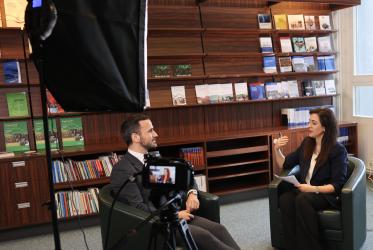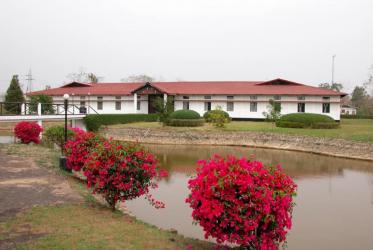Report
Global Platform for Theological Reflection
Manhasset, New York, November 20-22, 2009
Download the complete report (pdf)
Background and context
The theological reflection text which follows was developed in response to a five-day meeting of the fifth annual United Nations Advocacy Week (UNAW), and a three-day meeting of the Global Platform for Theological Reflection (GPTR), in Manhasset, New York, from November 15 through November 22, 2009. The focus of this joint UNAWGPTR meeting was on three areas of crisis: Climate Displaced Peoples, Indigenous Peoples’ Rights, and Colombia. The theme of the GPTR meeting was “Praying, Speaking Out, and Acting Together.” During the UNAW meeting, more than seventy-five people from every region of the globe participated in sessions held at the Church Center for the United Nations (CCUN). There, at the CCUN, we worshiped corporately; and gave and received reports from advocates working on behalf of those adversely affected by the crises noted above. Although we heard personal pleas which grieved our hearts deeply from our brothers and sisters of our member churches, we were also privileged to engage in joyful fellowship as we made new friends and re-connected with old friends over refreshments and a common mid-day meal each day. During the five days we spent together at the UNAW, a deep sense of community was forged.
After the adjournment of the meeting of the UNAW, a much smaller contingent of twenty-one met for the Global Platform for Theological Reflection during the weekend. At the St. Ignatius Retreat Center in Manhasset, we gathered to reflect theologically on what we had seen, heard, experienced, and felt during the previous days, as preparation for the task of developing this theological text on advocacy. Although we were a small group, our hope was that the text we developed would inspire a wider and ongoing debate with member churches globally. Our group was comprised of biblical scholars, theologians, and social activists. We were vastly diverse in age; race and ethnicity; cultural experiences and backgrounds; nationalities; and theological perspectives. Although the task of theological consensus-building was complicated, it was also quite exciting, as pragmatic and experiential insights enriched the content of our reflection. Each one of us came to the task of contributing to the development of this text with a desire that it would be truly responsive to the needs and concerns of the members of the World Council of Churches (WCC). In the formal presentations from GPTR participants, frequent small-group sessions, periodic plenary reflections, and sharing over common meals, we overcame the difficulties inherent in such a gathering in what we believe was a true spirit of koinonia.
As a result, the method of our reflection was inductive, rather than deductive. The resultant text emerged in the context of paying particular attention to one another as we shared not only empirical data regarding our respective circumstances related to the focus of the conferences. We also shared our stories of heartache and sorrow, as well as the resolve and the hope which continues to fuel our struggle for justice for all of God’s creation. In our reflections, we drew from our distinctive experiences of faith, the wisdom of our cultural traditions which have been passed down to us, as well as from biblical texts and theological traditions of the past and present. In this context of sharing insights, praying and talking with each other, key themes and insights emerged regarding the nature of advocacy which we believe are more responsive to the crises which plague us at this time.
We acknowledge that there have been previous attempts to offer guidance to the churches on advocacy. However, as we reviewed previous texts, we were convinced that these earlier efforts failed to question sufficiently the corruption of global economic, social, and political structures. As such, we believe that previous theological resources have been inadequate to guide our member churches toward the kind of advocacy strategies which would address the plight of significant populations adversely affected by the concerns cited above. A more realistic reading of the signs of the time, ecumenically, must function on the local, regional, national, and global levels, simultaneously – not just one. We determined that a new guideline for theological reflection should be made available to the WCC members that would provide them with cultural wisdom and biblical and theological resources for the kind of advocacy which could facilitate a more holistic transformation in the lives of our sisters and brothers. As a result of our hearing the persistent cries of lament from fellow Christians, and hearing the reports on the current efforts of United Nations officials to respond to the human tragedies and ecological devastation, we are convinced of the severity of these crises and the urgent need for effective advocacy rooted in the cultural, biblical, and theological resources of our collective communities of faith.
We believe that churches are called to be nurturers of a culture of life in the context of cultures of death. Our intentions in this document are to: 1) describe more clearly the nature of a Christian understanding of advocacy in our time; 2) present more compelling reasons to exercise more faithfully the prophetic task of stronger advocacy; and 3) provide some of the necessary resources for the churches to improve their efforts toward the kind of advocacy that fosters liberating change. We have been prayerful in our discernment of what God is calling us to do in this context and believe that the theological reflection which follows is a faithful response to that divine call. Our hope is that this current document will encourage our churches to develop even better strategies for effective engagement and accompaniment with those who suffer under these present crises.
Although this text arises out of our engagement with our sisters and brothers who suffer unjustly and disproportionately in their particular contexts, we believe that readers will find many important insights which would be easily applicable to other contexts which also demand advocacy. We believe we can answer affirmatively that our theological reflections have responded attentively to the sense of urgency conveyed by the testimonies and stories shared by our sisters and brothers in the global ecumenical community.




